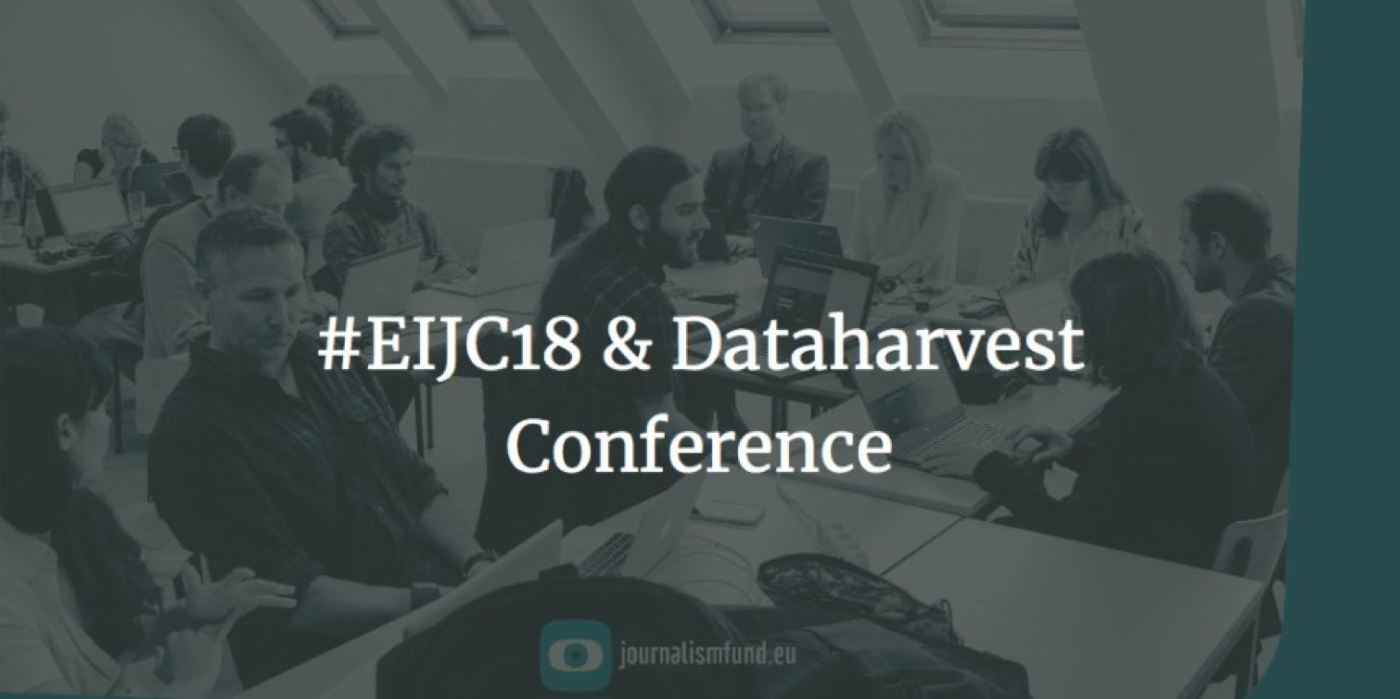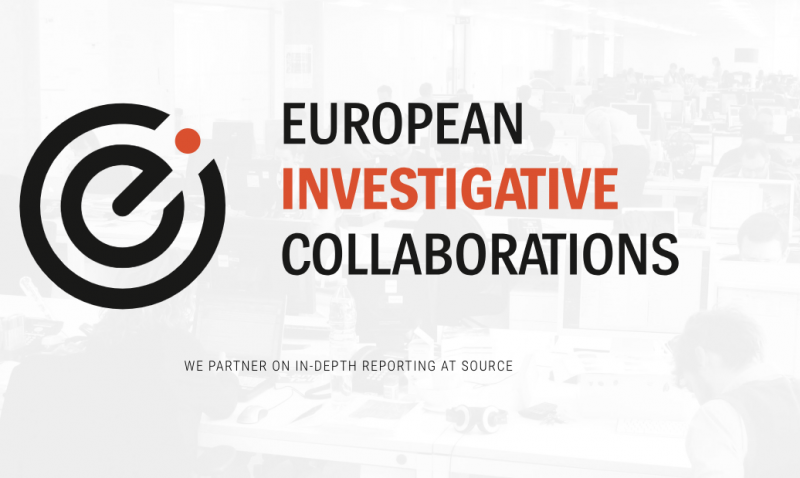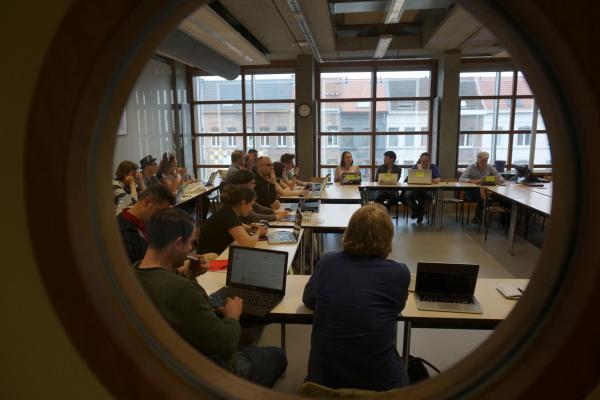A few years ago, we decided to be more proactive in propelling, stimulating and facilitating diversity in the media landscape. The best way to do that was by setting up an incubator through which we can offer support to innovative journalistic initiatives.
Here is a closer look at three such initiatives that have been conceived or have matured with our support, and how they have positively impacted the media landscape.
Three examples of how our incubator serves as a catalyst for media and news diversification
1) The European Investigative Journalism Conference & Dataharvest

The EIJC & Dataharvest was officially created under Journalismfund.eu’s wings. It hatched in 2011 from seeds planted earlier by two communities of investigative journalists: Wobbing.eu (specialised in FOI legislation) and Farmsubsidy.org (specialised in EU spending and data journalism). From 2011 until 2018, Journalismfund.eu provided the necessary support structure for the conference to mature.
And mature it did. Over the course of those eight years, the Dataharvest grew from a small-scale meet-up of 35 colleagues to an esteemed and highly anticipated yearly conference with 470 participants from 52 different countries attending a total of over 130 sessions. Where the first few editions of the conference were modestly focused on bringing together data journalists, FOI specialists and investigative journalists, later editions constantly grew in scope and ambition. The EIJC & Dataharvest 2018, for example, included a pre-conference Hack Day and Train the Trainers meeting, as well as tracks ranging from algorithm accountability over entrepreneurial journalism to tax and finance. There was even a collection of hands-on sessions called the Data Lab where SQL, Excel, Python, OpenRefine and other data and programming software was taught.
After the 2018 edition, the EIJC & Dataharvest moved from under Journalismfund.eu’s wings to become a stand-alone event powered by Arena for Journalism in Europe. Since its inception, the conference has had a direct and growing impact on the investigative and data journalism landscape in Europe. For example, it proved the perfect breeding ground for some large-scale collaborative transnational investigations such as Security for Sale and the MEPs Project, and even lead to the creation of new investigative networks such as Investigate Europe and EIC.Network, both of which subsequently benefited from our incubator themselves and are now maturing into established transnational investigative platforms.
2) EIC.Network

The European Investigative Collaborations Network is an independent ‘network by agreement’ that hatched at the 2016 EIJC & Dataharvest. It is made up of a mix of journalists from legacy media, digital, public and non-profit players from across Europe. On the margins of subsequent Dataharvest editions, Journalismfund.eu provided venues and support for the EIC team to meet and discuss stories, ideas and ongoing projects. The network also got the chance to present in panels and even launch projects during the conference, something they did with their Malta Files project.
Journalismfund.eu’s continued support allowed EIC to grow beyond the Dataharvest. With its unique model and way of working, EIC is an innovative and necessary new player in the media field. The stories they do are decided on before research begins, at which point every journalist has the option whether or not to join. Publication, too, is every member’s own responsibility. There is no central editorial package that is translated in different languages; each participating journalist does their own story. EIC does not only publish stories, but also data sets and scrapers, as well as its free open source network technology. Their goal is to democratise investigative networks and help take access control away from infrastructure intermediaries to put it in the hands of journalists.
EIC has had a real impact on the journalism landscape. It has so far published over 1500 articles in a dozen languages in more than 20 countries. Through its journalist members working for legacy media it has brought networked investigative journalism into the heart of several newsrooms across Europe: Der Spiegel, L’Espresso, NRC, Le Soir, De Standaard, Politiken, Expresso, VG, Tamedia, Radio Télévision Suisse and Nacional. But EIC also works with professionals from beyond those newsrooms, journalists from other regions in Europe, affiliated with organisations like the Romanian Centre for Investigative Journalism or The Black Sea. Thanks to those diverse contacts, EIC manages to bring different skills, expertise and views to an investigative journalism landscape that has traditionally been very Western European-oriented.
3) The Flemish Journalism Fund
The Flemish Journalism Fund was launched in September 2018 with the specific purpose of offering future-oriented support for independent, high-quality and innovative journalism in Flanders. The fund is a collaboration between Journalismfund.eu, the Flemish Journalists Association VVJ and the Flemish Government. The idea for a fund focused on innovation in journalism had been smoldering in our lap for some time, inspired by the Dutch Stimuleringsfonds voor de Journalistiek. After all, journalism is in a massive transition at the moment in the way it is produced, shared and consumed. Without support, quality journalism is in danger of becoming disconnected from a large part of the citizens it is supposed to inform.
The aim of the Flemish Journalism Fund is threefold: to offer grants for innovative journalistic projects, to initiate a platform for knowledge-sharing about news and media, and to foster collaboration with the Netherlands. As far as innovation is concerned, the fund wants to go beyond the so-called ‘Shiny Things Syndrome’ and focuses not solely on technology, but on innovation in all aspects of journalism. That means that stories or initiatives that make use of new ways of storytelling are eligible for support from the Flemish Journalism Fund as well. The same goes for initiatives trying to develop an interesting business model, or for journalists who think about new ways to reach a public that might not normally have interest in or access to quality journalism.
In the one year that the Flemish Journalism Fund has existed so far, it has already left its mark on the Flemish media landscape. Not just via the innovative projects it supports – in 2018, it distributed 500,000 Euros in grants to 11 projects that were approved out of 37 applications – but also via the pressure it exerts on policy makers. It has for example, together with the Pascal Decroos Fund for Investigative Journalism, published a memorandum with ten clear and concrete suggestions to improve the quality and diversity in Flanders’ journalistic landscape.
The support structure Journalismfund.eu offers the Flemish Journalism Fund through its incubator is necessary for the fund’s survival. Without Journalismfund.eu’s logistic and administrative support, the Flemish Journalism Fund would not yet be able to stay afloat, which would mean a loss for media diversity in Flanders.
We will continue to look out for interesting initiatives to adopt in our incubator to keep encouraging diversification in the media landscape and, ultimately, strengthen democracy.
Author: Raf Njotea
Photo: EIJC & Dataharvest 2018 © Thomas More Mechelen.

